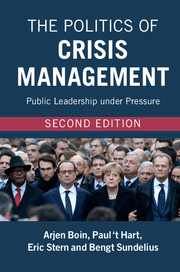Book contents
- Frontmatter
- Contents
- List of Figures
- List of Tables
- Introduction to the Second Edition
- 1 Managing Crises: Five Strategic Leadership Tasks
- 2 Sense Making: Grasping Crises as They Unfold
- 3 Decision Making and Coordinating: Shaping the Crisis Response
- 4 Meaning Making: Constructing a Crisis Narrative
- 5 Ending a Crisis: Managing Accountability
- 6 Learning and Changing: From Crisis to Reform
- 7 How to Deal with Crisis: Lessons for Prudent Leadership
- References
- Index
2 - Sense Making: Grasping Crises as They Unfold
Published online by Cambridge University Press: 15 December 2016
- Frontmatter
- Contents
- List of Figures
- List of Tables
- Introduction to the Second Edition
- 1 Managing Crises: Five Strategic Leadership Tasks
- 2 Sense Making: Grasping Crises as They Unfold
- 3 Decision Making and Coordinating: Shaping the Crisis Response
- 4 Meaning Making: Constructing a Crisis Narrative
- 5 Ending a Crisis: Managing Accountability
- 6 Learning and Changing: From Crisis to Reform
- 7 How to Deal with Crisis: Lessons for Prudent Leadership
- References
- Index
Summary
What the Hell Is Going On?
On the morning of September 11, 2001, U.S. President George W. Bush was listening to a group of children reading at a Sarasota, FL elementary school when he learned about the second plane crashing into the World Trade Center. He stayed in the classroom for several minutes, ostensibly listening to the reading. But the cameras captured the look of shock on his face as the president tried to make sense of the news that the country had come under attack.
The 9/11 terrorist strike took Bush, his country, and the rest of the world by complete surprise. As the drama unfolded live on television screens across the globe, people found themselves watching in disbelief: “This cannot be happening.” This sense of collective stress soon gave rise to pressing questions: how could this have happened and why did the authorities not see it coming?
Making sense of an unfolding crisis – from its roots to its “hot” phase and its aftermath – is a core challenge of crisis management. If intelligence agencies recognize an emerging threat early on, they can try to prevent it from materializing. If crisis managers quickly and fully understand the causes, characteristics, and consequences of an unfolding crisis, they are more likely to mitigate its impact. The sense-making task thus has two components: detection (of emerging threats and vulnerabilities) and understanding (of an unfolding crisis). In this chapter – and this is our key question – we ask what factors affect the effectiveness of sense making before and during crisises.
Detecting an impending threat before it escalates into a full-blown crisis can be extremely hard. Whether it is a prison riot or a terrorist act, a natural disaster, an international conflict, an environmental contingency, or an economic crisis – authorities rarely see them coming. Yet, hindsight knowledge always seems to reveal that there were strong indications of growing risks or outright warnings that somehow went unnoticed or failed to prompt remedial action. This is not because of some inherent incompetence of policymakers and organizations. In this chapter – and this is our first core claim – we argue that many types of impending crises are very difficult to recognize in advance.
- Type
- Chapter
- Information
- The Politics of Crisis ManagementPublic Leadership under Pressure, pp. 23 - 48Publisher: Cambridge University PressPrint publication year: 2016



